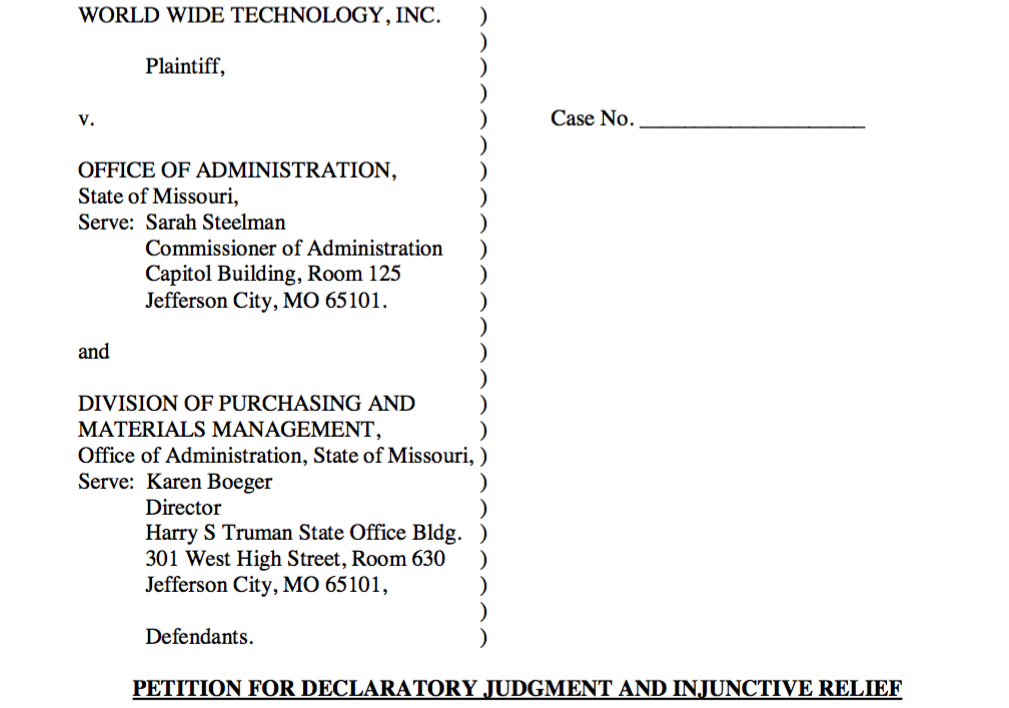JEFFERSON CITY, Mo. – A St. Louis-based technology company is alleging Missouri’s Office of Administration (OA) used an unlawful, arbitrary, and unfair scoring method in the awarding a large state contract.
World Wide Technology (WWT) has held the PC Prime Vendor Services contract with the Show-Me State since 2001, a relationship that has been “overall positive.” The contract allows state agencies to purchase computer hardware, software, software maintenance, and value-added services on an as-needed basis through WWT.
The state’s contract with WWT was originally scheduled to end June 30, 2016, but after several contract extensions, was scheduled to end March 31, 2018. Missouri issued a Request For Proposals in June 2016. WWT, along with two other companies, New Jersey-based SHI International and Kansas-based Technology Group Solutions, submitted bids for the contract.
OA used a scoring system of a total of 200 points between four categories, of which a maximum of 100 points could be awards for cost, 40 points for experience of the organization, 50 points for method of performance, and 10 points for Minority Business Enterprise/Woman-owned Business Enterprise participation commitment. In the final score, SHI was awarded 197.620 points, WWT 188.572, and TGS 126.960 points.
On February 9, 2018, Missouri awarded the contract to SHI. SHI is represented by the Nexus Group. Nexus has a wide portfolio at the feet of former OA Commissioner Simmons and partners Kate Casas, Brian Grace, and Boyd, bringing a wealth of experience to contracts.

“We are excited to partner with the state to bring innovative IT solutions to Missouri State Government,” said Denise Verdicchio, public sector senior director at SHI. “Our contract will provide Missourians with more effective and efficient IT services and support, while saving taxpayers a significant amount of money over what the state is currently paying.”
Subsequently, WWT lodged a formal bid protest and filed a lawsuit in Cole County to void “an unlawful procurement for state services and preliminarily and permanently enjoining the Office of Administration from entering into any contract resulting from the unlawful procurement.”
The lawsuit alleges that the state violated procurement requirements in six instances: by applying unpromulgated rules; by unlawfully calculating MBE/WBE participation points; by failing to treat offerors equally; by unreasonably, arbitrarily, and capriciously calculating cost points; by failing to give WWT preference as a Missouri company; and by awarding the contract to a non-responsive offeror.
One allegation is that OA failed to treat offerors equally. The discrepancy that WWT identified is in the evaluation of references.
The revised request for proposal (RFP) provided that: “The evaluator’s inability to contact a reference due to incorrect or inaccurate reference information or failure of the reference contact person to respond may be considered an invalid reference.”
According to OA’s Division of Purchasing’s award summary, two of SHI references were contacted but did not respond to the state’s request while they did not contact two of WWT references since directed contact was not provided.
Since SHI was awarded full points, the lawsuit alleges OA “did not treat SHI and World Wide’s alleged reference deficiencies equally.”
WWT, who has been represented by Flotron & McIntosh’s Richard McIntosh as a lobbyist since 2000, was awarded 35 out 40 points, while SHI was awarded 40 out of 40 points. Flotron & McIntosh have represented a variety of clients in purchasing for almost the past two decades, particularly with technology clients.
WWT further contends that in their original proposal, they “provided a total of 14 reference projects. Including the State of Missouri contact information provided above, 11 of the 14 may be contacted directly by the State, unmediated by WWT. Contact for two reference projects (MEDCOM and MODOT) must be mediated by WWT. One project (U.S.- based Global Aeronautics Manufacturer) is provided as a case study only as the customer prohibits contact of any kind.”
“We cannot comment on what motivated our competition to burden the taxpayers of Missouri with defending a lawsuit,” Verdicchio said. “We are comfortable knowing that we competed in a fair and clearly defined marketplace and were awarded business based on the merit of our proposal. SHI is now looking forward to delivering world-class IT products and services to the benefit of the taxpayers of the State of Missouri as soon as possible.”
Under contention by WWT is also the way cost points were calculated. The lawsuit refers to the method as “unreasonably, arbitrarily, and capriciously.”
SHI does not hold the same concerns as WWT, saying they believed the process was clear.
“We believe the evaluation and scoring were properly conducted in a fair and deliberate manner. Because of this award, the citizens of the state will be getting superior service and the lowest price,” said Verdicchio.
The state broke their cost evaluations down into 10 categories. Of the three bidders, WWT was the highest bid and thus had the lowest score. Here is how the state evaluated SHI and WWT’s bids for cost:
| Category | Max possible Points | SHI | WWT |
|---|---|---|---|
| Desktops | 20 | 19.557 | 17.631 |
| Portable Computers | 15 | 14.085 | 13.156 |
| Servers | 8 | 7.322 | 7.296 |
| Peripherals | 8 | 8 | 7.671 |
| Printers | 8 | 8 | 7.525 |
| Non–Microsoft Software | 10 | 10 | 9.782 |
| Microsoft Software | 15 | 15 | 14.816 |
| MFR provided value added services | 5 | 4.72 | 5 |
| Contractor provided value added services | 3 | 2.936 | 2.964 |
| P-Card usage fee | 8 | 8 | 7.732 |
| TOTAL | 100 | 97.62 | 93.572 |
The information below shows the exact markup percentages for SHI and WWT rather than the points awarded after calculated through OA’s formula.
| Category | SHI markup percentage | WWT markup percentage |
|---|---|---|
| Desktops, Portable Computers, Peripherals and Printers | 2.75 | 4 |
| Servers | 2.75 | 4 |
| Software and Maintenance (excluding MS) | 2.5 | 4 |
| Microsoft Software and Maintenance | 1.25 | 2 |
| MFR provided value added services | 5 | 10 |
| Contractor provided value added services | 5 | 4 |
| P-Card usage fee | 2.45 | 6 |
The lawsuit claims direct savings to the state by going with SHI over WWT. However, WWT supporters point to WWT’s economic impact projections. In an RCGA report, February 28, 2018 analysis of the economic contribution of WWT shows a direct/indirect effect of $1.973 billion to the St. Louis metropolitan area and a direct/indirect estimated state and local tax effect of $56 million.
SHI has transformed itself since 1989 from a $1 million “software-only” regional reseller into an $8.5 billion global provider of information technology products and services. Just in the past year, the company has been recognized as the Microsoft US Public Sector 2017 Partner of The Year, HP U.S. Print Hardware National Solution Provider of the Year, as one of Forbes America’s Best Midsize Employers 2017, and more.
The cost formula used by the state compares bids against each other and not to a baseline of comparable or past contracts, causing the highest cost offeror to receive cost points, even if the offer is unreasonably expensive, while an unreasonably low offer will receive maximum cost points, even if the offer is so low that the offeror cannot perform the contract.
The gross profit of the contract for either company is a relatively small fraction their respective business. The estimated cost for administration of this contract is $1 million. In WWT’s case, this contract only represents a gross profit of roughly $3 million. For SHI, this contract represents roughly a $1.75 million gross profit.
There are multiple examples of contracts that the expected savings from the lowest cost vendor has ultimately resulted in higher real costs to the state, which has bidding observers concerned about the change from a long-term in-state contractor.
The most recent example is the Medicaid eligibility contract for the Department of Social Services. The contract was awarded to a low-cost vendor but couldn’t fulfill the contract requirements and thus required emergency procurement.
The State of Missouri is also facing an Attorney General and State Auditor review on a lottery contract and litigation on a Medicaid eligibility contract.
Earlier this year, Gov. Eric Greitens declared that he was going to focus on growing the companies already here in Missouri. A New Jersey-based firm being awarded the contract contradicts the statements made by the Governor and his administration.
The lawsuit also points out that the Missouri Statutes express a preference for Missouri companies in competitive bidding. However, the RFP has no meaningful way of recognizing a Missouri-base company for the economic impact.
This contract award provides the state with the opportunity to look at how the reality of supporting Missouri-based companies in relation to cost and economic potential and how the contract procurement process plays a role is administrative declarations.
READ THE LAWSUIT BELOW:
